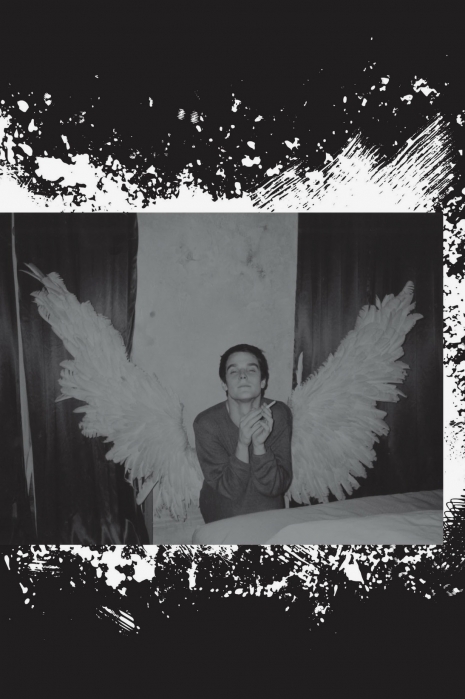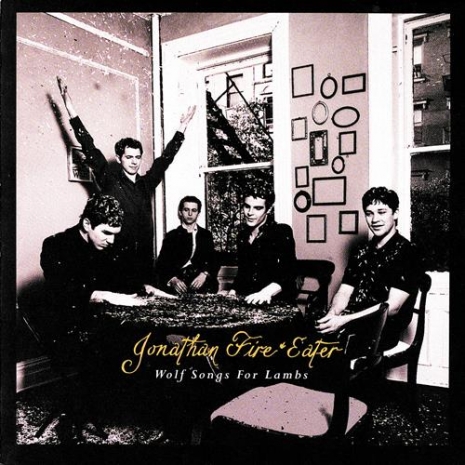
Photograph by Erin Norris
There’ll never be a reunion tour, and there’ll never be a fancy box set of rarities and non-album tracks, but Jonathan Fire*Eater had a brief, important run as an attention-getting band in New York City, just a few years before the formidable Brooklyn scene of the early 2000s coalesced. The lead singer and primary songwriter for the band was Stewart Lupton, who sadly passed away of unknown causes over the weekend at the age of 43.
When they were an active band it was their fate to be resented, and as soon as they stopped existing it was their fate to be sorely missed. Jonathan Fire*Eater would probably have been a bigger deal in the eyes of posterity if they had emerged a few years later than they did. The band consisted of five young men who had met at a fancy prep school in Washington, D.C., who relocated to the Lower East Side in the very last moment that it would be considered a sketchy neighborhood. In the event, they signed to the brand-new Dreamworks SKG label for “a million-dollar three-record deal,” according to Carl Swanson’s article about the band, which appeared in the New York Observer right after they broke up in the summer of 1998. Three members of the band, Paul Maroon, Walter Martin, and Matt Barrick, would team up with Hamilton Leithauser and Peter Bauer from the Recoys to become the Walkmen, which put out several quality albums.
Jonathan Fire*Eater’s trick was to foreground slippy, atmospheric percussion and employ the guitar sound primarily for rhythmic or modal effects. The prominence of the electric organ in their sound ensured associations with garage rock, but they were really an art rock band influenced by the Velvet Underground, even as Lupton’s vocals frequently channeled Mick Jagger. Lupton was one of the few people in the world who had could get away with writing rock lyrics that invited descriptors like “dripping” or “drenched.” It was self-consciously “poetic” material about decadence and discord, vignettes of excess. Some examples:
And if I fly first class on a 747
Oh I got magazines and gin
I read a clubber’s guide baby to Berlin
Oh I can see the glaciers and the dorsal fins
Out here on the tundra
There ain’t no thunder
The ink-spot sky pulling me under
Under we go
(”Bipolar Summer”)Are you married to an unfaithful world
Where you carry the flags if they come unfurled?
Are you locked into a projection booth
That shows the films of your troubled youth?
(”Everybody Plays the Mime”)Come a-hither come a-hither to me under the canopy
Pull the sheets up high another milky sky
There are oranges and bananas and coffee with cream
Try to be patient now while your brother tells his dreamI remember a storm and a picnic by the lake
I remember the mess a little anger can make
I eat my breakfast like the food at a wake
Like a little lamb
(From “A Night in the Nursery”)
The band was a bit famous for a while, but often in contexts that foregrounded the unlikelihood of their ever securing mass acceptance, which gave the whole project a quixotic feel. They opened for Blur and Pulp and Suicide and made Dreamworks pay for some necessary dental work required by their manager, Walter Durkacz, who was once a DJ at Danceteria. I remember in the 10th anniversary issue of Time Out New York, it was revealed that the worst-selling issue the magazine had ever put out was the one with them on the cover. This was a very Jonathan Fire*Eater sort of factoid.
The rest of the band were drinkers—haunts included the No Tell Motel, Mars Bar, and Max Fish—but Lupton was into heroin; the rest of his all-too-short life would be defined mainly by his valiant attempts to get clean, as Amy Haben’s excellent interview with Lupton dating from 2015 amply demonstrates.

I was living in Providence during much of their run, and I never ended up seeing “JFE,” as my friends and I always styled them in the early years of Internet chat. I did end up seeing Lupton play at the CMJ Music Festival of 1999 in a venue in the West Village that was much too big, much too well lit, and much too sparsely occupied for most performers to resonate, and Lupton’s evident substance abuse ensured that he would not be the exception that proved the rule.
It was heartening to see Lupton quoted so extensively in Lizzy Goodman’s 2017 book Meet Me in the Bathroom, it seemed to show that he had gotten his shit together and had processed his experiences from the 1990s in some way. Goodman sensibly depicted Jonathan Fire*Eater as an important stage-setter for more successful bands like the Strokes and Interpol.
We are lucky indeed that the band did leave behind one clear masterpiece, that being 1997’s Wolf Songs for Lambs, which isn’t even on YouTube as a single file. (Used CDs of the album aren’t difficult to find, though.)
“When the Curtain Calls for You,” Jonathan Fire*Eater live at Irving Plaza, February 1998: